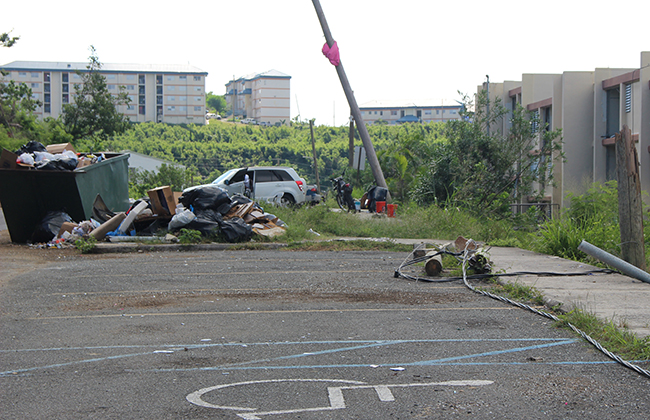RCA churches in the U.S. Virgin Islands are exploring possiblities for rebuilding that will help when the next hurricane hits.
The RCA sent two staff members to the U.S. Virgin Islands last week to evaluate the islands’ recovery after this fall’s powerful hurricanes and to make plans for how the RCA and local churches can help in the next months and years. Stephanie Soderstrom, coordinator for Volunteer Engagement, and Scott Engelsman, coordinator and facilitator for Global Mission development and engagement, met with the pastors and leaders of St. Thomas Reformed Church and St. Croix Reformed Church.
Here, Englesman shares more about what he saw on the islands and the RCA’s disaster response plans going forward:
Devastation and despair are the two words that I would use to describe what I saw last week in the Virgin Islands. St. Thomas and St. Croix were hit very hard by Hurricanes Irma and Maria this fall and in many ways the islands remain in shambles. However, despair is starting to be replaced by hope and people are making plans for the future.
St. Thomas Reformed Church, which provided hundreds of meals a day in the aftermath of the storm, has handed that work off to the American Red Cross and the Salvation Army. The church has turned its efforts toward rebuilding and hosted its first volunteer group a few weeks ago. Dozens of groups will be helping in coming months, and all volunteer slots have been filled until August 2018. For more information on volunteering in St. Thomas, contact RCA Volunteer Engagement: volunteer@rca.org or 616-541-0895.
You can still easily see the effects of the hurricanes on both islands. We saw four-story apartment buildings that no longer have walls on either side. Hundreds of homes and buildings have been reduced to rubble. Optimistic estimates show that just 35 percent of the islands’ electrical power has been restored. The majority of people still don’t have access to safe drinking water.
But there is also so much hope for the future when you talk to non-government leaders on the islands. Even as power lines still need to be repaired, people are making plans for how to rebuild their communities. I was encouraged to hear that those conversations are not just about “how to get back to where we were,” but instead, “how can we rebuild in order to minimize the damage the next time a hurricane hits?”
Our churches are exploring possibilities that would help their communities weather future storms. St. Thomas Reformed Church is considering reopening a well on the property and turning its undercroft (basement) into a freshwater cistern so the community has a local source of water during emergencies; that way they won’t have to rely on deliveries of bottled water from off-island. They’re also looking at infrastructure for electricity, exploring solar panels or a windmill rather than being dependent on gas to run generators, since gas is one of the scarcest resources after a storm. St. Croix Reformed Church is talking with the long-term recovery group on their island to explore how to be a part of recovery efforts.
The RCA initially provided $25,000 for food and water in the weeks after the hurricanes. While we don’t yet know what long-term projects the RCA will be helping our churches with, we know that we’ll be able to play a key role in sending volunteers and funding because of the generosity our donors have already shown. The goal is to rebuild in a way that will allow our churches and their partners to be better able to weather storms and respond to local needs without needing as much outside help next time. We are asking questions like, What would it look like if the church had alternate sources of water and power and we didn’t have to wait for bottled water? and, How can we rebuild in a way that benefits our future plans for our community?
I can’t wait to see the final vision for rebuilding that comes from the long-term recovery and rebuilding teams on both islands. We know St. Thomas and St. Croix will look different than before, but I am confident that they will come back stronger than ever. We are thankful for your ongoing support for these communities.





